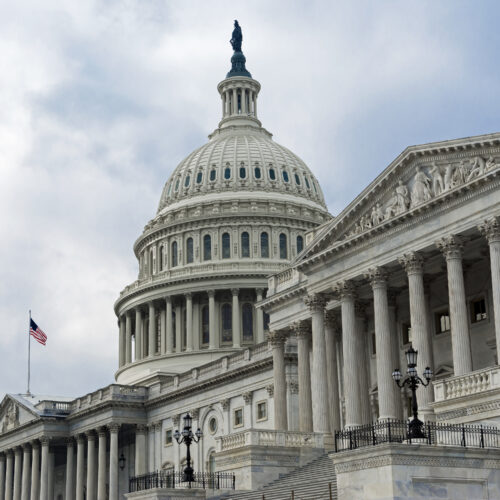National Center for the Right to Counsel bill entered in U.S. House

Pleading the Sixth: On October 30, 2013, U.S. Representative Ted Deutch entered a bill to create a federally funded National Center for the Right to Counsel to aid states in meeting their constitutional obligations under Gideon. Though a national center providing grants and technical assistance to states has been talked about for decades, Rep. Deutch’s leadership puts words into action.
“From our unsustainably high rates of incarceration to the lives of families torn apart by wrongful convictions, the economic and moral costs of our grossly inadequate systems of public defense are too profound to ignore,” announced Representative Ted Deutch (D-Florida) upon entering a bill on October 30, 2013 in the United States House of Representatives to create a federally funded National Center for the Right to Counsel (“National Center”). If enacted, the National Center will aid state and local governments meet their constitutional obligations under Gideon v. Wainwright, and its progeny, through a combination of federal grants, research, data collection and technical assistance.
A look at what the National Center will do
As presently conceived, the National Center will be a non-profit 501c3 entity, located in the District of Columbia, and overseen by a nine-person Board of Directors. The bill directs the President, with advice and consent of the Senate, to appoint the Board. Mirroring national standards relating to the oversight of state and local defender programs, the Deutch bill requires Board members to have a significant commitment to, or experience providing, quality indigent defense services.
The National Center’s mission to improve public defense in America will be achieved primarily through discreet two-year to three-year grants made to state or local governments and public defense systems for the purpose of improving or establishing public defense systems. The National Center will be authorized to promulgate standards to measure the effectiveness of the resources invested in states, and to determine if a recipient has indeed improved services as intended.
Of course, it will be nearly impossible to assess the quality of indigent defense services in all of the more than 3,000 counties across the country from an office in the District of Columbia. Cognizant of this fact, the bill requires each state to create a nine-person state advisory council to monitor individual systems within the state, receive complaints, notify the National Center of any violations of Center-promulgated standards, and to facilitate communications amongst divergent defense providers throughout the state. The nine members of the advisory boards will be appointed by a state’s Governor (3 appointees), Chief Justice (3) and U.S. Senators (3), from a list of nominees compiled by a state’s bar association in cooperation with the U.S. Department of Justice’s Access to Justice Initiative. In essence, the state advisory councils will be the eyes and ears for the National Center. As such, the state advisory councils must submit yearly assessments of the states and make recommendations to improve services. These reports will be compiled by the National Center into an annual report to the President and Congress on the state of the right to counsel in America.
Besides these critical grant-making and assessment functions, the National Center is designed to serve as a clearinghouse for indigent defense information and data, and to contract with outside entities to conduct needed research, training and/or technical assistance. Perhaps of most interest to existing indigent defense providers, the Deutch bill also provides immediate assistance to them in the form of regional back-up centers. As envisioned, these regional back-up centers can perform a number of critical tasks, from providing information on available grants, and assisting local public defense systems apply for said grants, to qualifying investigators and sentencing mitigation specialists.
If enacted as presently drafted, the National Center will receive its funding through the Byrne/JAG Grant Program. The Attorney General will have the discretion to provide funds to the National Center. However, these funds cannot be less than 10 percent of the total funds provided each year to the Byrne/JAG Grant Program. Finally, the Deutch bill will require the Governmental Accounting Office (GAO) to conduct an assessment on the work of the National Center, four years after its establishment, to gauge the effectiveness of the nation’s investment in improving the right to counsel.
Support for a National Center already mounting
The creation of a National Center has long been an aim of national organizations working to remedy longstanding systemic deficiencies in the delivery of constitutionally protected indigent defense services. For example, The Constitution Project, National Right to Counsel Committee’s seminal report on the public defense crisis, Justice Denied, recommends a national indigent defense center to “strengthen the services of publicly funded defender programs in all states by providing grants, sponsoring pilot projects, supporting training, conducting research, and collecting and analyzing data.” The Deutch bill achieves all of these objectives.
The National Association for Public Defense, in their letter of support, states that by “creating a system that has an oversight board, regional backup centers, and state advisory councils, all staffed by individuals who demonstrate a commitment to working with and advocating for the population in need of representation, this legislation can provide standards that every state must meet,” and will go a long way to fulfilling the promise of Gideon that has largely gone unmet for the last 50 years.
Most importantly, the American Bar Association (ABA) has long been on record recommending the creation of such a center, having passed a resolution supporting such an idea in 1973 and again in 1979. Most recently, in an October 15th letter to Attorney General Eric Holder supporting the creation of a White House Commission on the Fair Administration for the Indigent Accused, the ABA notes that in February 2013, the ABA House of Delegates passed a resolution urging “Congress to establish an independent federally funded Center for Indigent Defense Services for the purpose of assisting state, local, tribal and territorial governments in carrying out their constitutional obligations to provide effective assistance of counsel for the defense of the indigent accused.” The ABA letter notes that the ABA Criminal Justice Section – a section made up of both prosecutors and defense lawyers – proposed the most recent resolution.
Conclusion
The ABA letter makes a good case that a White House Commission may be a necessary interim step to garner support for a National Center, such as the one proposed by Rep. Deutch. Rep. Deutch entered the bill because, “Congress has an obligation to ensure that our justice system is administered fairly and that the constitutional rights of all Americans are protected.” We believe the President holds that same obligation.


